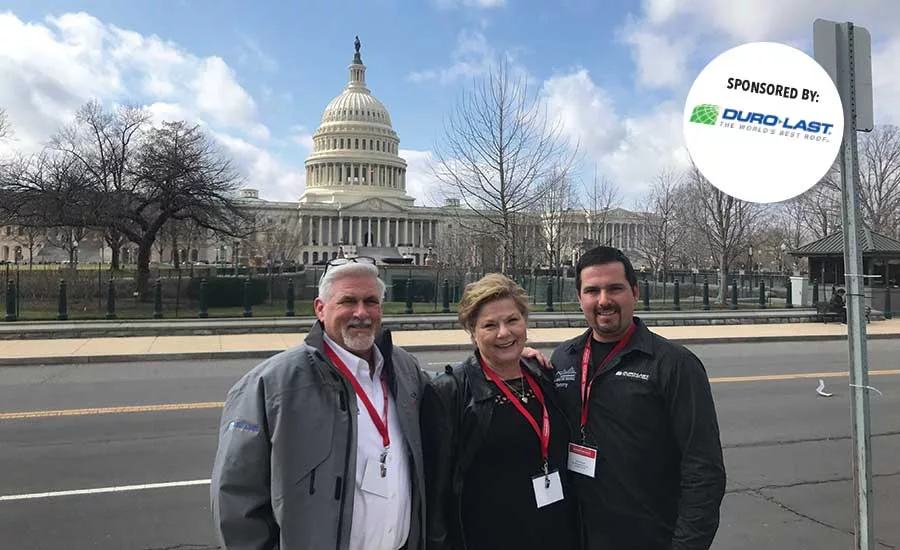Contractor Profile: ROOF Management Commercial and Industrial Roofing
Doing the Right Thing, in Good Times and Bad, Propels this Roofing Family into its Fourth Generation

Members of the Deichert family (from left) Tom Sr., his wife, Terry, and son, Tommy, pose across the street from the U.S. Capitol in Washington, D.C. The trio were part of the Michigan delegation of roofing industry professionals to participate in the first-ever national Roofing Day last March.

Crews with ROOF Management exclusively install Duro-Last roofing systems on various commercial projects, including this complicated reroof project above an Applebee’s in Metro Detroit. Photos courtesy of ROOF Management.

The 103,000 square-foot reroof of the Kroger and Cambridge Plaza in Hazel Park, Mich., earned the 2016 Project Award in the Custom Fabrication category from Duro-Last.

ROOF Management has generated record revenues in each of the past two years with large projects like this 180,000 square-foot reroof of the PackSpec, Inc. manufacturing facility near Detroit Metropolitan Airport.
Waiting outside the Washington D.C. offices of a sitting member of congress, Tom Deichert calmly thumbed through the sheets of talking points he and hundreds of other roofing contractors from across the country were briefed on just hours earlier. Workforce, immigration reform and regulations were on the agenda for the first-ever national Roofing Day last March, and he wanted to make sure he had the messages ready to go when it was his opportunity to speak.
And when it came, he ditched the talking points and instead spoke from the heart.
“We just don’t push working with your hands anymore,” explained the founder of ROOF Management of Farmington Hills, Mich. “We’ve been pushing kids toward four-year degrees and that’s really hurt our industry. They don’t even have a chance to know if they like working outdoors, with their hands and creating something. We’ve got to bring that back.”
Deichert, sitting alongside his wife, Terry, and son, Tom Jr., was attempting to put a face to the major issues facing roofing contractors looking to succeed in any market. But his appeal to this legislative aide showed his deeply-embedded blue collar roots established while growing up in Metro Detroit, and it was intimately personal.
To him, roofing is more than just a job. It’s more than just a paycheck, or a means to provide a comfortable lifestyle. Roofing, instead, is his passion, his purpose and duty in this world, and a familial bond that he’s now passed down to a fourth generation, with the potential for more.
A Matter of Pride
The Deicherts started their commercial roofing company as a couple in 1993, but their connection to roofing started much earlier. Terry’s father, Bill Daniels, owned Bright Roofing & Sheet Metal, a large, unionized roofing company that helped build some of the Metro Detroit area’s largest and tallest commercial structures over four decades.
She grew up around the business and it wasn’t long after she and Tom started dating, that her father recruited him into the profession. Tom, who was pouring concrete basements at the time, started at the bottom and worked his way up from union journeyman to foreman, to superintendent and then project manager. He learned the trade quickly and began to see the opportunity that roofing provided for a stable future. As his father-in-law approached retirement, Deichert had grown proud of being a roofing contractor and was committed to making it on his own.
Milestones were small at first. The Deicherts, who married in 1982, started the company from a makeshift attic space in their home, which allowed Terry to answer calls, type contracts, invoice clients and keep up with the kids.
“I remember how excited we were to purchase our first brand new truck,” she recalled. “We had found our niche — small enough to handle jobs that the big boys didn’t want, and too small to handle mid- to large roofing jobs.”
Focused primarily on roof maintenance, Tom was building a potential client base and strong reputation for good work and honest roof assessments. He also established a strong relationship with Duro-Last, which since 1999 has developed into ROOF Management’s exclusive roofing supplier. The company outgrew its warehouse space in downtown Detroit and in 2006 moved all operations to one building in the northern suburbs. As Terry explains it, no sooner had they signed the paperwork, Detroit’s automotive-based economy started to suffer mightily as the Great Recession began.
The flight of revenue, jobs and eventually people from the Metro Detroit area set the region into an economic tailspin that was quickly swallowing up the Deichert’s lifeswork. With more than a dozen long-time employees — including two of their own children — the Deicherts had to make a choice.
They could lose their business — throwing themselves, their children and trusted employees whom they’d grown attached to into mounting economic uncertainty. Or, they could lose the house they’d raised their family in and start over, while clinging to hope that the economy would rebound.
They chose the company and filed for personal bankruptcy, abandoning their home of 28 years.
“Providing (our employees) a means to earn a living was something we didn’t take lightly and it weighed heavy on our hearts,” Terry explained. “We had gotten to the point that it wasn’t just about us anymore; we had a lot to consider. In the end, we have the satisfaction knowing that we made the right decision and we would do it again the same way.”
Despite the added stress it caused for the family, the Deichert children said they understood and appreciated the difficult decision.
“The way I saw it was they created this company out of our attic, with all their heart and soul, and built it up,” said Tania, now the office manager, who’s bedroom was closest to original company headquarters. “The house was just a house.”
Bounce Back
Even in a sputtering economy, it didn’t take long for the Deichert’s decision to stay in business to begin paying off. Tom Sr. began to delegate more of the day-to-day operations to his son and industry veteran Kent Goodling, while he focused solely on roof sales. New jobs and clients started rolling in as the auto industry began churning again.
The momentum hasn’t stopped, as the company established record revenues in each of the past two years. It’s also earning industry-wide recognition, capturing the 2016 Project Award in custom fabrication from Duro-Last for its 103,000 square-foot reroof of the Cambridge Plaza in Hazel Park, Mich. Last year, the manufacturer named the Deicherts Platinum Contractor Award winners, placing them in the top 3 percent of all Duro-Last contractors nationwide.
The company shows no signs of slowing down — as long as the industry’s labor woes don’t stretch its backlog any further.
“Finding good labor is at the top of our list along with finding laborers that can pass a drug test,” Terry said. “If these kids are flunking out of school, skipping school, and hate school, let’s give them an option before they turn to drinking and drugs.”
Following their day of industry advocacy on Capitol Hill, the Deicherts said they were encouraged to learn that both senators they visited were supportive of enhancing career technical education programs and services provided by high school guidance counselors.
But they’re not waiting for the bureaucrats to get the process started.
“This year my goal is to work with the local schools and try and get some of the kids that hate school to use as a pilot program similar to what used to be their co-op program,” she said. “Let’s let these kids see that they can make a good living working with their hands.”
Looking for a reprint of this article?
From high-res PDFs to custom plaques, order your copy today!





